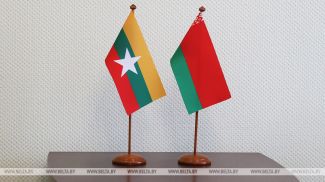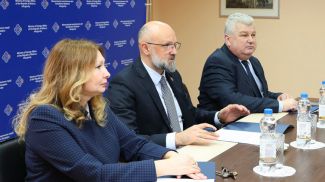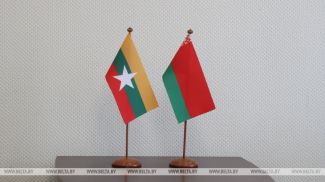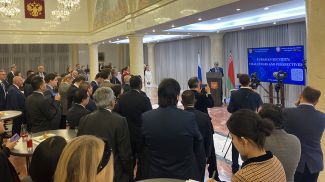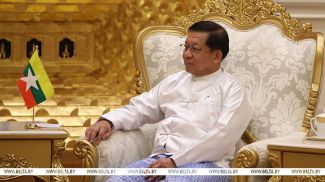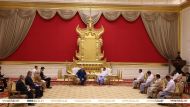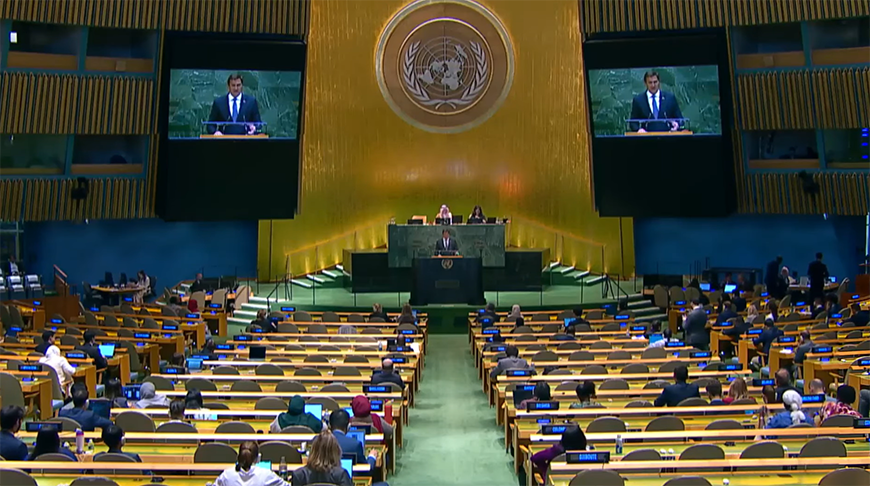
un.org video feed
New York, or more precisely Manhattan, its historic core, always resembles a beehive during the last week of September. It is there that an austere glass palace on the East River hosts a week of high-level meetings as the main event of a regular session of the UN General Assembly. But this year’s sessions and meetings can hardly be called routine. This year the United Nations Organization celebrates its 80th anniversary, and this milestone seems to prompt the countries to look back on the eight decades and remember how the world once tried to talk instead of fighting. The high-level week is a mirror of the planet. It reflects fears and ambitions, fatigue and determination, the voice of the weak and the confidence of the strong. And if the huge hall of the General Assembly is capable of uniting such different peoples for at least a few days, then humanity still has a chance to step back from the brink of the abyss.
For the Belarusian delegation led by Minister of Foreign Affairs Maxim Ryzhenkov, this week was not just a diplomatic ritual. It was an opportunity to have their say, declare their readiness to be part of the global dialogue, hear someone else’s truth, and, most importantly, defend their own. It is confirmed by the busy schedule of the New York visit: participation in high-level meetings and debates, negotiations with colleagues, and, of course, a speech at the plenary session. Yes, Maxim Ryzhenkov could also have had an interview with the CNN, because, as they wrote on social media, a small window had just opened up this week... But staging such a show as well as tailing members of foreign delegations is not our style. Read about Belarus's approach to global problems and its assessments in our article. Bookmark it.
AGENDA. FROM CLIMATE AND SUSTAINABLE DEVELOPMENT TO ARTIFICIAL INTELLIGENCE AND NUCLEAR DISARMAMENT
The high-level week is not just a solemn summit. It is a key moment when states declare their priorities, ambitions, and readiness for joint action. But in the face of multiple global threats such as war, climate, public health, migration, and technological challenges, the efficiency of this week will be measured not by the number of statements made, but by how many of them translate into real actions.
Global challenges and a multipolar world
On the first day of his visit to New York Maxim Ryzhenkov made a speech at a high-level event organized by the Chinese delegation to discuss the Global Development Initiative. This initiative was proposed by Chinese President Xi Jinping in 2021 and aims to ensure the implementation of the 2030 Agenda for Sustainable Development.
In subsequent years China also formulated the Global Security Initiative and the Global Civilization Initiative. These three global initiatives of China lay down the principles upon which China is currently building its foreign policy. Maxim Ryzhenkov noted that all of those are examples of responsible global leadership.
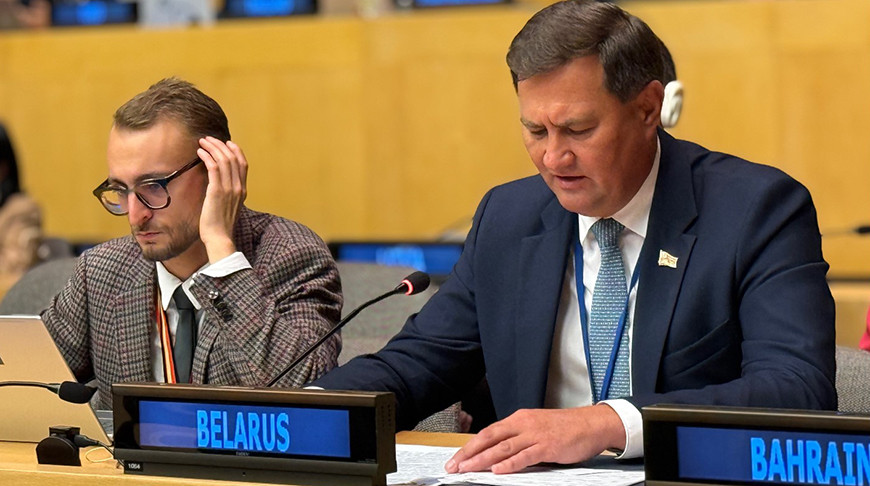
“It is particularly important that this leadership has manifested itself in conditions of international instability and uncertainty caused by the crisis of the Western liberal system. All these initiatives are based on the understanding that only through joint efforts, only by forming a ‘community of common destiny for mankind’, can we tackle global challenges and lay the foundations for a fair multipolar world,” the Belarusian diplomat emphasized.
The minister added that Belarus and China consistently advocate for multipolarity, peace, development, and multilateral cooperation. “Belarus will continue this policy, contributing to the implementation of China’s global initiatives and promoting its own proposals,” the Belarusian minister of foreign affairs added.
Interests of the Global Majority
To be sincere, international cooperation in the field of sustainable development leaves much to be desired. Why is that? Belarus President Aleksandr Lukashenko said in the UN back in 2015: “Sustainable development is impossible without peace”. These words can be seen as guidance for action but…
The established situation was actively discussed at the first biannual summit on a sustainable, inclusive and resilient global economy in New York, USA under the chairmanship of the UN secretary general.
Maxim Ryzhenkov remarked that for the last three decades countries of the West have been doing everything they could to shore up their disappearing hegemony and to dominate by infringing interests of countries of the Global Majority. The creation of armed conflicts, the provoking of color revolutions, and the nursing of the flame of war in a number of regions across the globe fail to contribute to any development let alone the sustainable kind.
According to the minister, in order to fix the situation, it is necessary to take a number of steps. In the political dimension it is necessary to stop and reverse the negative trends in global politics. “We believe the organization of a global dialogue on security in the true San Francisco spirit to be instrumental in this regard. Belarus mentioned the need to organize the dialogue back in 2017. We are deeply convinced that sooner or later such a dialogue will start: life itself will make it happen!” Maxim Ryzhenkov stressed.
In the economic dimension it is necessary to revise the existing models of cooperation. “We are witnessing the fragmentation of the global economy. This is an inevitable result of the selfish policies of Western countries, which undermine the established procedure for the operation of international economic institutions. It has become absolutely clear that this globalist system is incapable of operating in the interests of global development,” the Belarusian diplomat explained. “In turn, this understanding necessitates the creation of a new, fair, multilateral architecture for development.”
According to Maxim Ryzhenkov, the core of this new system is actively evolving through regional associations such as the SCO, ASEAN, the EAEU, and the Arab League as well as via international forums like BRICS, which are not tied to the Western economic model.
In the financial dimension it is necessary to pay attention to international commitments on development aid. At present they often depend on political preferences of donor countries. But, Maxim Ryzhenkov believes, it is necessary to eliminate all external obstacles hindering the financial stability of states at the national level.
“Illegal sanctions, trade and currency wars, crazy tariffs, financial seizures, and restrictions on access to innovations and investments diminish the financial potential of states,” the Belarusian minister of foreign affairs said.
The green agenda and hypocrisy of the West
Consequences of the climate change are not as critical for Belarus as they are for many other countries but the republic shares the general concern about this phenomenon. Maxim Ryzhenkov described Belarus’ approaches during a high-level meeting organized under the aegis of the UN secretary general and the Brazil president.
First of all, the minister of foreign affairs stated that Belarus honors the commitments in full to reduce greenhouse gas emissions undertaken under the Paris Agreement and intends to continue advancing in this direction.
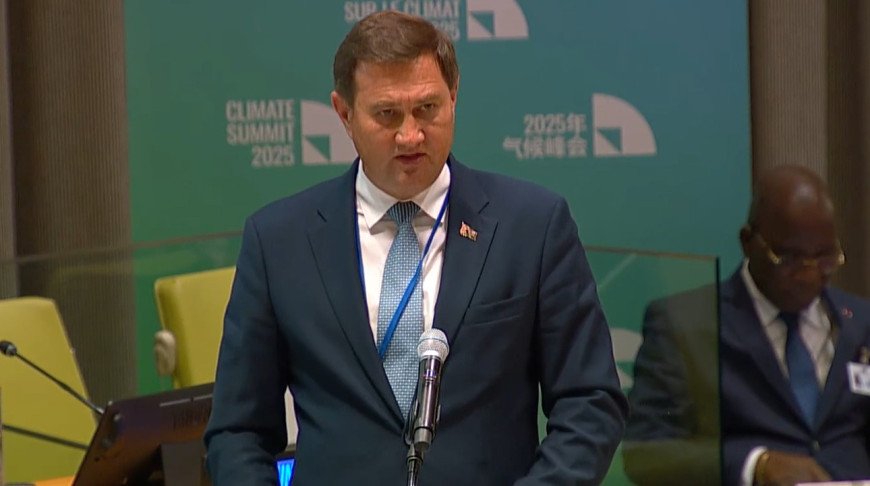
“By the way, let me remind you of the massive political storm that erupted around Belarus during the construction of our nuclear power plant. Today it is already obvious that this was driven by the protectionism of international corporations and the interests of some EU countries. Meanwhile, like many other countries Belarus’ access to technologies is problematic because of economic restrictions and barriers in international trade introduced by the West. Without them our contribution to the green agenda would be even more significant,” Maxim Ryzhenkov stated.
He stressed that it is the Western countries that bear historical responsibility for climate change due to their centuries-long policy of plundering natural resources and extensive industrial development. “Today it is they who hypocritically manipulate the climate agenda to suit their interests and force everyone to adjust to the rules they have invented,” the diplomat pointed out.
Maxim Ryzhenkov referred to a series of alarming trends. In particular, he mentioned an increase in arms production in NATO countries. It has resulted in a 15% increase in their military emissions into the atmosphere. The minister also reminded of the prohibition to use Belarus’ air space, resulting in a considerable increase in carbon dioxide emissions into the European Union’s air space.
The Belarusian minister of foreign affairs believes that all the solutions for mitigating the consequences of climate change are obvious: it is necessary to stop hypocrisy and politicization of the climate change topic by putting an end to illegal unilateral sanctions and by arranging technology transfer to countries in need.
“Justice and equality, as Chinese President Xi Jinping correctly noted. And only joint efforts – through national actions and international cooperation,” the Belarusian diplomat urged.
Artificial intelligence and “silicon curtain”
Open debates of the UN Security Council were held in parallel with other events within the framework of the General Assembly. Heads of state and delegation leaders discussed not only current problems, but also the challenges that the planet may face in the future. For example, what threats to international peace and security could arise from the widespread and uncontrolled introduction of artificial intelligence.
We all understand that artificial intelligence opens up unimaginable opportunities for humans in all areas: in the fight against climate change, hunger, incurable diseases, and so on. However, not everything is so rosy and promising. According to the Belarusian minister of foreign affairs, artificial intelligence is like the proverbial double-edged sword.
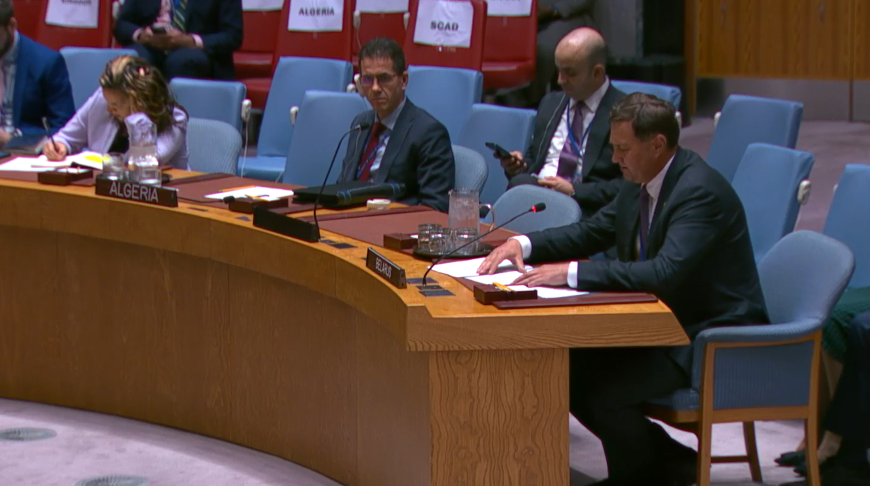
What did he mean? First and foremost, Maxim Ryzhenkov referred to attempts by the collective West to exclude other countries from the processes of developing and mastering artificial intelligence. According to the minister, the West believes that this technology will allow it to secure its military and economic superiority.
“In essence, a new iron curtain is being created in this area. This time it is not ideological, but technological: the silicon curtain is supposed to separate the West from the Global Majority, and return the latter to new neocolonialism. We are convinced that this is a road to nowhere, if not an abyss for all mankind. Artificial intelligence should be accessible to all countries without exception. Only then will this technology serve the interests of peace and development,” the diplomat stated.
Furthermore. Unending armed conflicts contribute to the rapid development of military technologies. Modern wars represent a confrontation of unmanned aerial vehicles, precision-guided munitions, and lethal autonomous weapon systems that may possess the self-learning function inherent in AI. A lot of technology thrillers have been made to demonstrate it. Starting with WarGames where a video game came close to launching nuclear missiles and ending with the Terminator with the Skynet system aiming to destroy humanity,” Maxim Ryzhenkov noted. “All this leads us to a key conclusion: AI must be under human control.”
The minister is convinced that new technologies should be aimed at improving human life and preserving human dignity. In other words, they should complement human abilities instead of completely replacing them.
“The thoughtless use of artificial intelligence can have serious social consequences. Therefore, clear accountability mechanisms for AI-driven decisions must be established. We believe China’s recent initiative to set up a global organization for cooperation in artificial intelligence to be a step in the right direction. Belarus wholeheartedly endorses it. Such a venue is extremely necessary for all of us. We need it as soon as possible for working out and reconciling mechanisms of common control over artificial intelligence development processes,” the Belarusian delegation head concluded.
By the way, the UN General Assembly is also an opportunity for members of regional associations to come together. In New York Maxim Ryzhenkov met with his colleagues from the Collective Security Treaty Organization (CSTO). The ministers of foreign affairs discussed strengthening the role and the visibility of the organization in the international security system as well as prospects for promoting collective initiatives on the global stage.
Challenges for middle-income countries
On the whole, no matter what issue one addresses, progress can only be achieved through cooperation and convergence of approaches. By the way, middle-income countries understood it a long time ago by uniting into a group of like-minded countries and trying to defend their interests together.
This association was created on the initiative of Belarus and Costa Rica in 2016. Every year ministerial meetings are held at premises of the UN General Assembly so that countries can compare notes and discuss joint actions for the near future. This September was no exception.
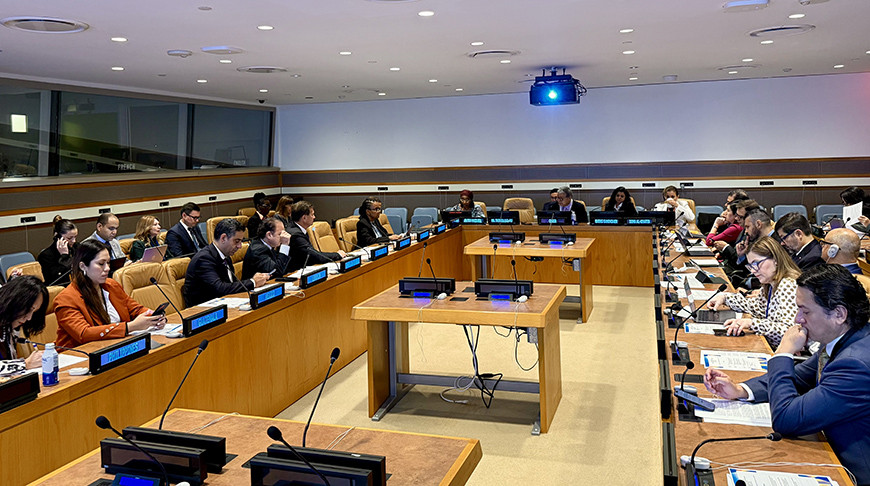
“The status of middle-income countries shows that we have managed to achieve significant development progress. However, our achievements are still relative, and there is much to be done. It is no coincidence that experts often refer to the situation in our countries as the 'middle-income trap.' Indeed, we are effectively stuck: our economies need new drivers of growth, innovation, and development. If we are not able to use them, there is a risk of us returning to the level at which many of us were before,” Maxim Ryzhenkov said at a meeting.
On the other hand, if countries manage to overcome these difficulties, they will be able to reach a much higher level of development and become more significant donors in the UN system, providing support to the least developed countries. In other words, the success of middle-income countries is an issue that should concern the entire UN system.
“We firmly believe that success is possible only through joint efforts. Only then will our voice be heard and taken into account. It means that the interests of middle-income countries should be viewed through the prism of shared interests. We should do everything to convey this idea to other states and associations of states,” the Belarusian minister said.
The UN Charter and warnings from the past
The 80th anniversary of the United Nations Organization, which was born once the UN Charter was adopted, offered a good reason for a meeting of the Group of Friends in Defense of the Charter of the United Nations.
Has the world become safer and more predictable over the years, as was expected? Unfortunately, no. Deep mistrust, lack of dialogue, fear, and the threat of force continue undermining the international order. The United Nations itself is under threat. But, according to the Belarusian minister of foreign affairs, the UN cannot be blamed for it. In his words, only member states can and should make the organization stronger and more efficient. Clear and consistent steps are needed to achieve that. However, some decisions made in the past set a very bad example.
Maxim Ryzhenkov said: “Several years after World War Two the organization timely made justified decisions on creating an Arab state and a Jewish state in the territory of Palestine and on their peaceful coexistence. Regretfully, these valuable decisions were not implemented successfully back then. What is the result? For nearly 80 years we’ve been discussing the Palestinian problem. But the problem is only getting worse. We are now on the brink of a tragic situation when Palestinians are forced to abandon their homes in their native land. This tragedy may have irreversible consequences. We should not stay silent. This is why Belarus has supported the decision to resume the international high-level conference on the peaceful resolution of the Palestinian problem and on realizing the decision on the two states for the two nations.”
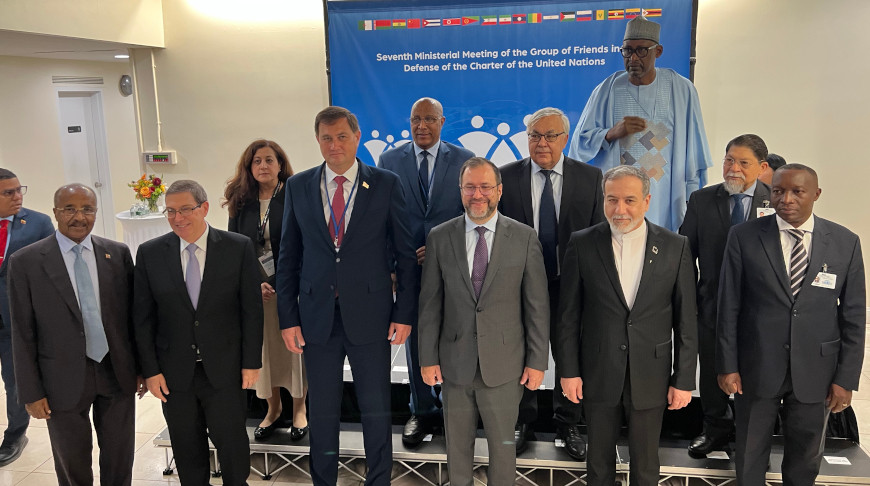
The Group of Friends in Defense of the Charter of the United Nations is united in solidarity with the Palestinian people and believes it is necessary to make Palestine a full member of the United Nations Organization.
Another wake-up call from the past caused by failure to comply with the principles of the organization concerns our friend Venezuela. Today it faces a real threat of the use of force.
“We should declare to the entire world that we once again express our firm solidarity with Venezuela and reaffirm our willingness to strive to eradicate the use of methods that are contrary to international law and the UN Charter,” the minister stated. “The use of unilateral coercive measures against more than 40 countries is yet another example of our failure due to a lack of collective solidarity and the ability to act as one against the West’s arbitrary approach to the Global Majority. This is the result of a unipolar world, where the West believes it has won the Cold War and now ignores the UN Charter and rules of the World Trade Organization.”
The Belarusian diplomat called on his colleagues to support by all possible means the gradual transition to multipolarity in international relations where the poles balance each other out and small and medium-sized countries feel greater protection under international law.
Nuclear weapons and nuclear disarmament
In 2013 the UN General Assembly established the International Day for the Total Elimination of Nuclear Weapons. This is a top priority in the field of disarmament, but so far not a single nuclear weapon unit has been physically destroyed in accordance with any bilateral or multilateral treaty and no negotiations on nuclear disarmament are underway.
The only encouraging thing is that this problem is regularly raised at the UN. At the same time, nuclear states seem to be in favor of disarming their arsenals, but they all wait for the other countries to take the first steps. Some countries even believe that only they should possess nuclear weapons, and then there would be no problems in the world. Well, what can we say...
To keep this topic in the spotlight, the UN General Assembly held a special meeting to celebrate and promote the International Day for the Total Elimination of Nuclear Weapons. The initiative seems good, but, as Maxim Ryzhenkov noted, countries have nothing to celebrate today because the world has returned to a point where the nuclear threat is clearly visible. The Doomsday Clock shows less than a minute and a half to midnight, which symbolizes the moment of nuclear apocalypse.
The minister recalled that back in the day within the framework of a new paradigm of international relations security guarantees and new principles of cooperation were developed. These included the non-expansion of NATO to the East, the creation of the OSCE with its principle of indivisible security, and the Budapest Memorandum, which guaranteed security to the countries that relinquished nuclear weapons. Including Belarus.
“However, today all guarantees and principles have been trampled. While we in the USSR and in the first years of our independence were disarming with the help of the West, removing nuclear weapons, and disposing of conventional arms, mines with their assistance, the West, as it turned out, was quietly rearming. Today they are even laying mines at our border: in Poland, Lithuania, and Latvia. Legitimate security concerns of other countries, including Belarus, were ignored. As a result today we see an unprecedented intensity of contradictions, including in our region of Europe. Moreover, we are left with no choice,” the Belarusian minister of foreign affairs noted.
In this situation in order to guarantee its own security, Belarus has been forced to deploy Russian tactical nuclear weapons in its own territory. For the same purposes, Russia’s Oreshnik ballistic missile systems will be deployed in the country. By the way, the treaty on security guarantees that Belarus and Russia signed last year within the framework of the Union State of Belarus and Russia provides for using any types of weapons for defense, including nuclear ones.
“We do not engage in a mindless arms race. We don’t provoke further confrontation. Our response is asymmetrical, purely defensive in nature, and is carried out in strict accordance with international law and the provisions of the Treaty on the Non-Proliferation of Nuclear Weapons,” Maxim Ryzhenkov stressed. “Why do more and more countries talk about the growing role of the nuclear factor in today’s world? Because in the absence of reliable security guarantees and real confidence-building measures states turn towards nuclear weapons as the last resort, which is capable of restraining a potential aggressor even without being used. And we see how it works.”
Unfortunately, the world has already learned the power of nuclear weapons. It happened a long time ago. Over the years, their power has only increased. It has become not just destructive, but monstrous. Indeed, there will be no winners in a nuclear war.
“It is very simple to prevent further nuclear escalation. All that is needed is focused work to develop reliable security guarantees for all countries without exception. And simple compliance with them. If there are guarantees, there will be trust. And the need for nuclear weapons will disappear by itself. We are ready to follow this path,” Maxim Ryzhenkov stated.
GENERAL POLITICAL DISCUSSION. STRAIGHTFORWARD, CLEAR, AND CONCISE ON BELARUS’ POSITION
Maxim Ryzhenkov gave a comprehensive assessment of the situation on the international stage during his speech at the plenary session of the UN General Assembly. It is from this rostrum that delegation leaders, one after another, raise issues of security, development, and cooperation before the world. Belarus’ statements were woven into this mosaic of voices, becoming part of the general conversation about the future of the planet.
Attempts to turn the post-war world order upside down
The general debate was dedicated to the organization’s anniversary: “Better together: 80 years and more for peace, development and human rights”. This is why the Belarusian minister of foreign affairs suggested recalling the events that happened 80 years ago and reflecting on them in order to find the true primal causes of the challenges and threats the planet faces today.
“The bloody and merciless war that was a big tragedy for humankind ended 80 years ago. And only at the cost of millions of sacrifices and shattered lives did we overcome this challenge. The contribution of the United States and the UK to the Great Victory, as well as that of the Chinese people who threw off Japanese militarism, is evident,” Maxim Ryzhenkov stated. “However, the Soviet people’s heroism was decisive, a multinational people who fought for their freedom and the freedom of oppressed nations to the last drop of blood. Remember, they never surrendered their cities to the invaders, never sought refuge behind Nazi-collaborationist governments, never equipped or manned the Nazi war machine. Back then, 80 years ago it was obvious.”
The minister noted that European capitals greeted liberators joyfully with flowers, erecting monuments and naming streets and cities after them.
“After just 80 years of peaceful prosperity in Europe, everything has changed. What do we see now? The West has created its own narrative about wartime events. It is erasing memory, tearing down monuments, rewriting history textbooks. Nazi slogans are once again heard regularly in streets of individual European cities. They raise a 21st-century generation, which did not witness horrors of that war and haven’t even heard about them from their parents. This is why they are fed by the false heroism of their ancestors who once joined Hitler’s coalition dreaming of global domination,” the Belarusian diplomat stated.
If history is rewritten, then its results are rewritten, Maxim Ryzhenkov noted. In his words, it also casts doubts on the correctness of establishing a post-war world order based on universal principles of the United Nations Organization. “It seems that it was forced upon the West temporarily. Well, the collective West was forced to share the burden of responsibility for the planet’s fate with the so-called Soviet bloc. It was forced to put aside thoughts about world domination temporarily, and certainly it was forced to wait. Wait for some event in order to turn everything upside down,” the Belarusian minister of foreign affairs stressed.
Problems in the operation of the United Nations Organization
What accomplishments does the United Nations Organization have ahead of its 80th anniversary? Yes, the UN remains the central element of international life. It was possible due to its unquestionable legitimacy, universal membership, and comprehensive agenda. “However, we observe that the principle of universality has been seriously undermined, especially in the last decade. By those who persistently try to turn the UN into an instrument for realizing their own interests. Moreover, contrary to the aspirations of all humanity,” Maxim Ryzhenkov noted.

Indeed, the United Nations Organization prevents the planet from sliding into a new world war. Its key mechanism, the Security Council, allows great powers to discuss matters of war and peace at the table rather than on the battlefield. “However, unfortunately, this body is being used less and less. Its influence on world affairs is not what it used to be. And, to be honest, the UN has proven incapable of preventing many bloody regional conflicts of our time. And this trend is only increasing,” the Belarusian minister of foreign affairs stated.
Under the auspices of the UN a vast network of international structures has been established and numerous legal documents have been developed. This infrastructure ostensibly provides the means for efficient cooperation across the entire spectrum of human activity. “But if you look closely, only a few of the UN structures remain truly functional. They accomplish their tasks. Why is that? It is obvious. The organization should keep up with the times. This necessitates reform and, first and foremost, of the UN Security Council. I am referring, among other things, to expanding the category of permanent members to include developing countries from Africa, Latin America, and Asia,” the diplomat explained.
Maxim Ryzhenkov pointed out that over the eight decades the number of UN members has increased by several times and many states that were not even on the world map when the UN was founded want their opinions and voices to be taken into account. “And they have the right to this because today they are important political and economic entities. They rightly expect the UN to work in the interests of all its members and to strengthen cooperation among them, rather than being a tool for manipulation by individual countries. Including for settling scores with other states,” the minister stated.
The fact that the UN is highly instrumentalized presents another problem. And actions of the United States of America to reduce its support for the UN are a very troubling signal, Maxim Ryzhenkov noted.
“If the organization can stay up to date and serve as an impartial forum, it will be needed by all: by the strong and the weak, by the developed and the developing. Otherwise, it will face the fate of the League of Nations. Belarus does not want that, as it sees no alternative to the UN for now. This is why we are speaking sincerely about these institutional problems. Including today. In order to understand their nature and make corrections,” the Belarusian minister of foreign affairs summarized.
A way to stop the bloodshed in Ukraine
In addition to the UN anniversary, this year also marks the 50th anniversary of the Helsinki Accords. This document was initiated by the leadership of the Soviet Union and cemented the realities that had developed in Europe after World War Two.
“Moreover, the act predetermined the stable nature of relations between the Soviet Union and the United States, which was reflected in all regions of the world and thereby helped make the Cold War slightly manageable. The most important legacy of the act also lies in the fact that it introduced the principle of the indivisible security, adherence to which prevented the Cold War from turning into a hot one,” Maxim Ryzhenkov said.
The Helsinki Accords provided an opportunity to build a united, indivisible and prosperous Europe during and after the Cold War. “However, history took a different path. The so-called victors in the Cold War have completely forgotten this principle today, adopted the logic of superiority and confrontation. By the way, it was precisely this logic that stood behind the process of NATO’s expansion to the east. As a result, the balance of power in Europe was undermined, and security threats emerged for many states. The Yugoslavia crisis, bloodshed in a number of post-Soviet republics, and indeed the conflict in Ukraine are the most vivid examples of such consequences,” the minister emphasized.

In his words, today it is obvious that to stop the bloodshed in Ukraine all the parties in Europe need to recognize the importance of observing the principle of indivisible security.
“It is important that one of the main global centers of power, the United States of America, is beginning to realize the importance of this thesis. Unfortunately, there is no such understanding in EU countries, which continue to fuel the regional conflict with Ukrainian firewood,” the diplomat noted. “This situation particularly requires common efforts to increase the level of trust between countries, although there are no ready-made recipes today. It is necessary to act. And in Belarus, which is located in the center of Europe, we probably understand it better than anyone. Because all the most tragic wars of recent centuries have been rolling through our country every fifty years, destroying everything but memory in their passage. That is why we say: hesitation is not an option,” Maxim Ryzhenkov emphasized.
A new Berlin wall
The minister of foreign affairs also drew attention to what is going on at Belarusian borders: European neighbors are laying mines, building walls, ditches, defensive lines, and barbed wire. In other words, they are trying to create among their populations a feeling of an impending threat from “barbarians” from the East.
“And, by the way, there are already first victims, albeit on the side of NATO soldiers, who either drown in swamps or blow themselves up with their own mines,” Maxim Ryzhenkov said.

He noted that a piece of the Berlin Wall is installed near the UN building as a trophy of civil rights. It reads: 155 kilometers that claimed 200 human lives.
“Today a much larger wall stretching thousands of kilometers is being erected on the EU border with Russia and Belarus – from Finland to Poland. And there have already been hundreds of victims along this wall since construction began. Hundreds of innocent migrants from the southern countries who, seeking a better life, strive to reach the EU, which previously destroyed the familiar way of life in their countries. If we all together in the UN cannot prevent the construction of this wall, let us at least reserve a spot where we will later place a piece of this wall. When the relevant countries finally come to their senses and say that such a wall is no longer needed. We will display its length and the number of people who died there. And we will say that this is a trophy to the freedom of movement,” Maxim Ryzhenkov stated.
Border fences and rigid self-imposed isolation
Maxim Ryzhenkov remarked that by building barriers, both physical and political, ideological, and ultimately civilizational, the European Union has isolated itself not from Belarus and Russia, but from the Global Majority.
“Therefore, in essence, all these political and military maneuvering by the EU at the eastern border along with economic sanctions against us are measures of severe self-imposed isolation, that drive the EU countries even deeper into an internal economic and political crisis. Let me reiterate – self-imposed isolation,” the minister stressed. “If European elites intend to persist on this way, it will get even worse for the peoples of Europe. However, all these problems can be solved if instead of self-isolation Europe embraces the concept of Eurasian cooperation and security on our vast continent.”
The diktat that is gone and a call for negotiations
The Belarusian minister of foreign affairs reminded of the Belarusian initiative to develop a Eurasian Charter for Multipolarity and Diversity in the 21st Century. It is designed to launch a new paradigm for the Eurasian architecture of equal and indivisible security.
“We call on all Eurasian states to join the process and demonstrate the same level of responsibility that our predecessors demonstrated half a century ago. There is no alternative to such a dialogue. We need to abandon the prejudices and come to the negotiating table. Without a doubt our call is also directed at the countries of the European Union, which are traditionally skeptical of any initiatives originating from the East. But I would like to remind them: this East is far from what it was even a decade ago. It is essentially the Global South or even the Global Majority, which must be reckoned with. It is high time to finally understand: the times of diktat by the collective West are gone,” the minister stated.

According to him, Europeans should reflect on their place in the world in light of the ongoing transformations, which do not benefit them.
“Declining economic competitiveness is undermining the traditional European model of the universal welfare state, leading to a fall in living standards and a rise in inequality as we can see. Rampant militarization of the region is driving Europe, particularly new EU and NATO member states, into a deep financial abyss. The civilizational foundations of the European society are rapidly eroding due to practically uncontrolled mass migration and a failed policy of faux multiculturalism as a response to this challenge,” the diplomat stressed.
An old world and a new one
Assessing the situation in the world, the minister of foreign affairs stated that today, more than ever the words of the great Italian thinker of the last century Antonio Gramsci have never been more relevant. He wrote from a fascist prison: “The old world is dying, and the new world struggles to be born.”
“Indeed, it is paradoxical that even today the new world is being born in agony because the old world does not want to exit the stage peacefully. And we are not destroying the old world. The West is quite good at it. But it is we, the Global Majority, who are trying to build a new one! I want to emphasize that we do it together. It is the key word in the title of our General Assembly. Together with our like-minded partners,” Maxim Ryzhenkov summarized.
BILATERAL NEGOTIATIONS. FROM SOUTH AMERICA TO ASIA
Key events often take place not in the General Assembly chamber, but in meeting rooms, on the sidelines, and during brief encounters in narrow corridors. Those are opportunities not just to convey one’s position, but to reach specific agreements.
More than two dozen meetings between Maxim Ryzhenkov and his colleagues from Latin America, Africa, and Asia have been officially reported. Imagine how many more unofficial contacts, conversations on the sidelines, and handshakes could have taken place. In short, the Belarusian delegation made the most of its chance.
In conclusion of the program of his visit the Belarusian minister of foreign affairs met with UN Secretary General Antonio Guterres. Maxim Ryzhenkov and Antonio Guterres discussed matters concerning the reinforcement of the UN’s central role in ensuring international security and sustainable development as well as the need to work out collective decisions on topical challenges of the modern world.
The minister confirmed Belarus is ready to contribute to the consolidation of efforts of states within the framework of genuine multilateral interaction. The minister also thanked the UN secretary general for supporting Belarus’ initiatives on Chernobyl affairs, fight against trafficking in persons, and the accomplishment of the Sustainable Development Goals.
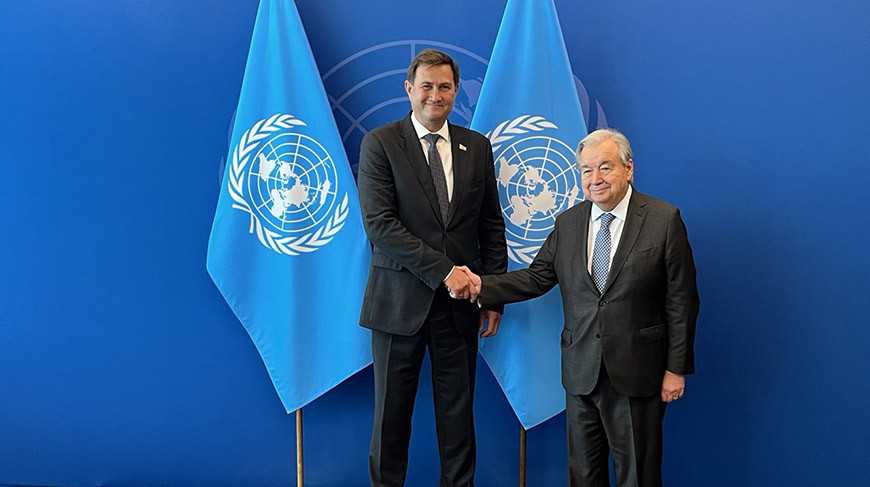
With President of the United Nations General Assembly Annalena Baerbock Maxim Ryzhenkov discussed the agenda of the 80th session of the UN General Assembly, matters concerning the reformation of the organization, and the election of the next UN secretary general.
The Belarusian minister of foreign affairs emphasized the need to ensure equal rights for all states as part of the UN General Assembly’s work. It was noted that a selective approach and the use of double standards that undermine trust in the universal nature of the United Nations Organization are unacceptable.
Throughout the last week of September Manhattan buzzed with the voices of tens of countries and everyone wanted to be heard amid the noise. Did Belarus succeed at that? That depends on whether others know how to listen and hear.




